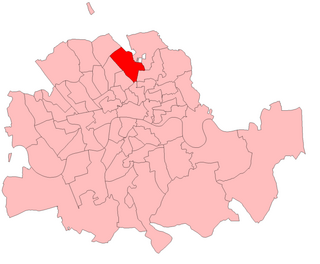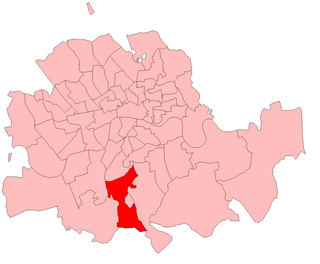
Gainsborough is a constituency in Lincolnshire represented in the House of Commons of the UK Parliament since 1983 by Sir Edward Leigh of the Conservative Party, who, since the 2024 general election, is the Father of the House.

Oswestry was a United Kingdom Parliamentary constituency. It was a constituency of the House of Commons of the Parliament of the United Kingdom from 1885 to 1983, when it was renamed North Shropshire. It elected one Member of Parliament (MP) by the first past the post method of election.

Islington East was a constituency which returned one Member of Parliament (MP) to the House of Commons of the Parliament of the United Kingdom from 1885, until it was abolished for the February 1974 general election.

Salford North was a parliamentary constituency in the City of Salford in Greater Manchester from 1885 until 1950. It returned one Member of Parliament (MP) to the House of Commons of the Parliament of the United Kingdom.

Salford South was a parliamentary constituency in the City of Salford in Greater Manchester from 1885 until 1950. It returned one Member of Parliament (MP) to the House of Commons of the Parliament of the United Kingdom.

Salford West was a parliamentary constituency in the City of Salford in Greater Manchester from 1885 until 1983. It returned one Member of Parliament (MP) to the House of Commons of the Parliament of the United Kingdom.

Norwood was a parliamentary constituency in south London which returned one Member of Parliament (MP) to the House of Commons of the Parliament of the United Kingdom by the first past the post system.

Hornsey was a constituency that returned one Member of Parliament (MP) to the House of Commons of the UK Parliament, 1885 — 1983. It was then largely replaced by Hornsey & Wood Green. Its voters using the first-past-the-post system elected the Conservative Party candidate at each election. Its closest result was a 1.29% majority at the 1966 election which saw the start of the Second Wilson Ministry. From 1945 onwards the runners-up in the seat were the Labour Party candidates.
Kingston or Kingston-upon-Thames was a parliamentary constituency which covered the emerging southwest, outer London suburb of Kingston upon Thames and which existed between 1885 and 1997 and returned one Member of Parliament (MP) to the House of Commons of the UK Parliament. The Conservative candidate won each election during its 112-year existence.
Holland with Boston was a county constituency represented in the House of Commons of the Parliament of the United Kingdom from 1918 to 1997. It elected one Member of Parliament (MP) by the first past the post system of election.
Liverpool East Toxteth was a borough constituency represented in the House of Commons of the Parliament of the United Kingdom. It elected one Member of Parliament (MP) by the first past the post system of election.
Liverpool Everton was a borough constituency represented in the House of Commons of the Parliament of the United Kingdom. It elected one Member of Parliament (MP) by the first past the post system of election.
Liverpool West Toxteth was a parliamentary constituency represented in the House of Commons of the Parliament of the United Kingdom. It elected one Member of Parliament (MP) by the first past the post system of election.
Blackpool was a parliamentary constituency centred on the town of Blackpool in Lancashire. It returned one Member of Parliament (MP) to the House of Commons of the Parliament of the United Kingdom.
Woodbridge was a county constituency centred on the town of Woodbridge in Suffolk. It returned one Member of Parliament (MP) to the House of Commons of the Parliament of the United Kingdom.
Birmingham Handsworth was a parliamentary constituency centred on the Handsworth district of Birmingham. It returned one Member of Parliament (MP) to the House of Commons of the Parliament of the United Kingdom. It was abolished in 1983.

Mile End was a parliamentary constituency centred on the Mile End district of the East End of London. It returned one Member of Parliament (MP) to the House of Commons of the Parliament of the United Kingdom.
Thornbury was a county constituency centred on the town of Thornbury in Gloucestershire. It returned one Member of Parliament (MP) to the House of Commons of the Parliament of the United Kingdom, elected by the first past the post voting system.
The 1921 Louth by-election was a by-election held on 22 September 1921 for the British House of Commons constituency of Louth in Lincolnshire.
Joseph Bennett was an English merchant and Liberal politician.










